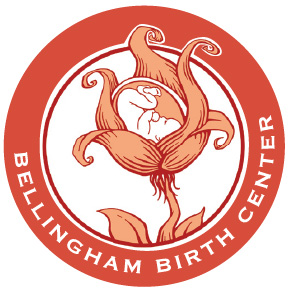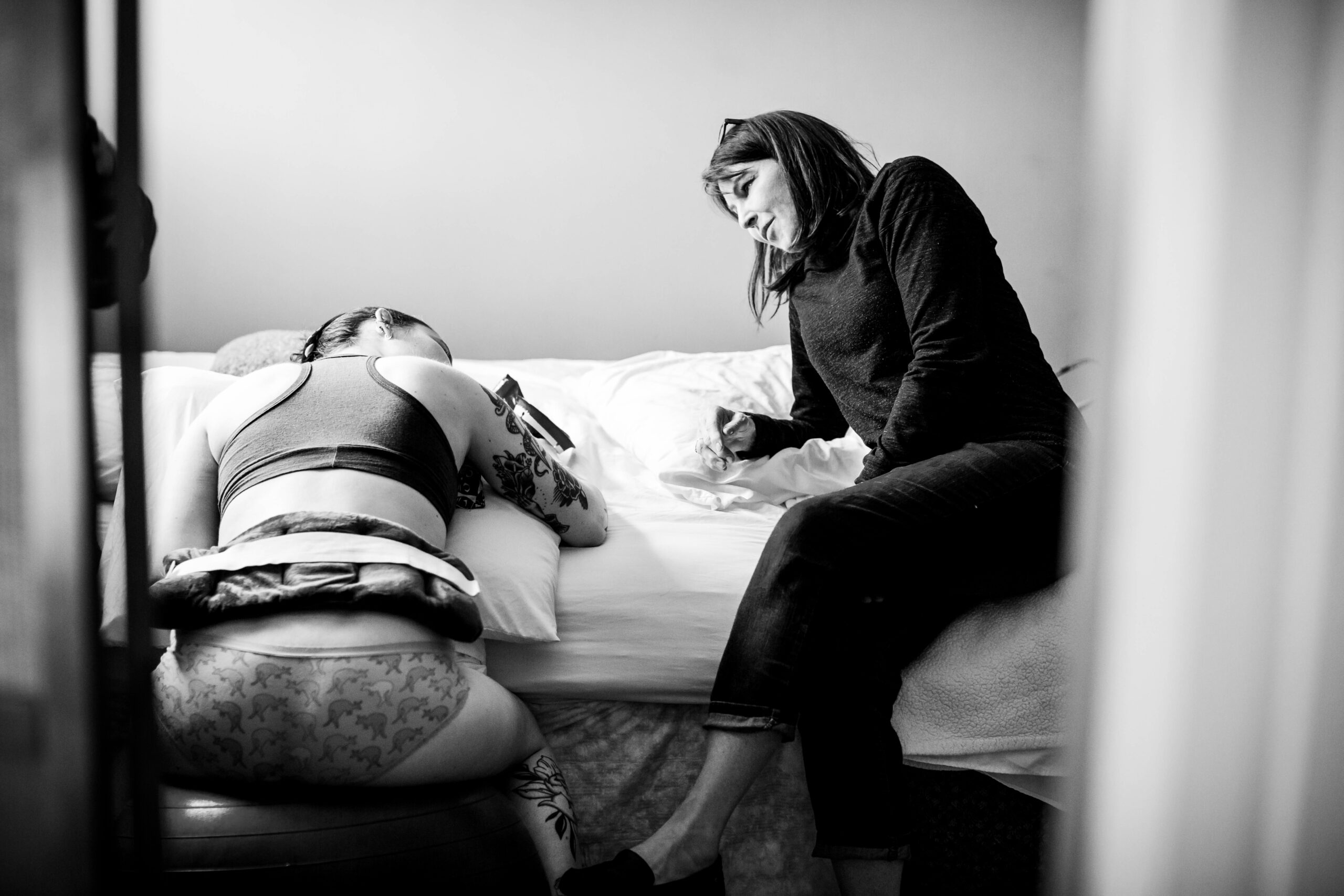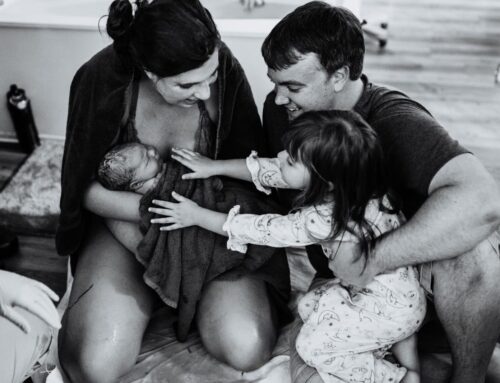Your birth space and your team shape your experience profoundly, making this one of the most significant decisions you’ll make during your pregnancy. For some families, these questions arise during their first pregnancy. For others, it’s only after experiencing birth that they begin to realize they want something different, more personal, more connected.
But finding the right place and the right care team isn’t always straightforward. That’s why we’ve put together some thoughtful questions to guide you on your decision-making journey.
Some questions are about the place itself. Others are about the person who you will invite to walk alongside you during one of the most transformative moments of your life. Of course, we hope your choice leads you to Bellingham Birth Center. But more than anything, we hope you feel empowered in your choice and deeply connected to the care you receive.

1. What kind of birth environment helps you feel most safe, seen, and supported?
For some people, they feel most at peace giving birth at home: it’s quiet, familiar, and entirely your own. It can be deeply grounding to labor in your own bed, walk your own halls, call your midwife to come to you when the time is right, and tuck into your own bed with your new baby at the end of the day (or night). But for others, the idea of not being close to a hospital can create stress, and that’s valid too.
For most people in this country, they feel safest in a hospital: it’s a setting where emergency support is always available. Hospitals offer reassurance through quick access to interventions and extra monitoring for high risk pregnancies. But that often comes with trade-offs: unfamiliar faces, shift changes, bright lights, and institutional routines that may or may not align with your preferences for birth. For some families, it feels less personal, less private, and harder to stay in their own rhythm, but for many, they are reassured by the high level of technology.
And then, there’s the free-standing birth center: purposefully created to be the best of both worlds. Birth centers offer the calm, comfy environment of a home birth with the added reassurance of fast hospital access if needed. You can move freely, labor in the tub, eat when you’re hungry, and be surrounded by midwives who know you and your hopes well. Our birth center is similar in many ways to home birth, but we have extra tools (like nitrous oxide, birth slings, and various birth stool options) that aren’t usually available at a home birth. Many people simply like the idea of going somewhere to have their baby that is clean, tidy and specially designed for unmedicated birth.
It’s not about choosing what’s right for everyone. It’s about choosing what’s right for you. Whichever setting you feel most reassured in – wherever you can imagine relaxing and opening most easily – that is the right place for you.
2. What priorities do you have for your birth?
For many expectant parents, this question is both exciting and overwhelming. Birth isn’t just about the outcome, it’s very much about the journey as well. Much of pregnancy and birth is not within our control, but we can make some important decisions along the way.
Some families want minimal intervention, a hands-off approach, and privacy. Others don’t care so much about knowing the people who will be there, don’t mind a bit of medical intervention, and want the option of an epidural close by.
People who choose our birth center often care about the ability to labor (or give birth) in a roomy birth tub, delayed cord clamping, interventions only if needed, and uninterrupted skin-to-skin contact with their baby. They generally are hoping for a calm, unhurried experience, the freedom to move, eat, and labor in their own way, and feeling safe and respected and truly seen by their midwife.
But not every birth setting or provider can accommodate all of these things. Hospitals often have more rigid protocols and staff rotations that can make your birth feel more clinical than personal. Some practices are fully supportive of informed choice and autonomy, while others may rely heavily on routine or policy.
That’s why choosing the right place and the right people matter so much. At Bellingham Birth Center, we’re deeply committed to honoring your priorities. Our midwives offer care that’s collaborative, personalized, and flexible. Whether you’re dreaming of a quiet water birth or simply want a provider who takes the time to listen to and connect with you, we’ll help you shape a birth plan that reflects your values and feels right for your family.
Here are 3 helpful questions to ask when exploring a birth center to make sure it aligns with your priorities, preferences, and the kind of experience you truly want.
3. Is it Safe?
Yes, absolutely. For healthy, low-risk pregnancies, giving birth at a licensed birth center is not only safe, it’s deeply satisfying and supported by a growing body of research. Conversely, it is not safe for people having high-risk pregnancies. There is a long list of conditions that define this, but some big ones are twin pregnancies, babies born before 37 or after 42 weeks, babies who are not head down at term, high blood pressure, or any indication that the baby is not completely healthy.
Many large, well-designed, peer-reviewed studies have shown that outcomes for low-risk clients under midwifery care in a birth center setting are just as safe as those in a hospital, with a far lower incidence of medical interventions. The key to this being safe is that licensed midwives work with people who are considered low-risk. They are trained to recognize when medical collaboration is needed and will refer or transfer care if complications arise.
Somehow, midwives manage to provide satisfying, deeply connected care while protecting their clients against unneeded medical interventions like inductions, forceps and cesareans. How? Because we are present throughout active labor, keeping an unobtrusive eye on how the labor is unfolding. Because we know that in most cases, babies can be born without a whole lot of intervention. Because we recognize when that’s not happening and when we need to jump in.
Here at Bellingham Birth Center we’ve been honored to serve families since 2004, and we’re on track to welcome our 2,000th baby born under this roof. That’s over two decades of trusted, family-centered care.
If you’d like to read the studies or talk more about the safety of birth center care, we’re always happy to share the research and answer your questions. Feeling confident and informed is part of feeling safe, and you deserve both.
4. Who is eligible to give birth at a birth center like Bellingham Birth Center?
If you’re having a healthy, low-risk pregnancy and are hoping for an unmedicated birth, there’s a good chance you’re a great fit for birth center care. That is still true even if you started care elsewhere and are part of the way through your pregnancy.
At Bellingham Birth Center, we work with a wide range of families from first-time parents to those growing their families again, who are looking for a more personal, connected birth experience. We welcome clients of all ages, backgrounds, and identities.
While there are some medical conditions that mean a hospital birth is a safer option, many people with controlled conditions, like hypothyroidism or diet-controlled gestational diabetes, can still be eligible for midwifery care in a birth center setting.
The best next step? Reach out. We’re happy to talk through your specific situation, or you can schedule a free consultation with one of our midwives. Together, we’ll help you figure out if birth center care is the right path for you.
The beauty about our birth center is that you have choice when it comes to midwives too. Because just like every birth is different, every midwife brings her own energy, approach, and philosophy to the experience. So how do you find the right fit?
Here are 3 thoughtful questions to help you choose the midwife who feels aligned with your values and vision for birth.
5. What is your personal birth philosophy?
Every midwife at Bellingham Birth Center practices within the “midwifery model of care.” This means we believe birth is a normal, physiological process and that people deserve respectful, informed, and individualized support. But within that model, each midwife brings her own heart, perspective, and passion to the work.
Asking your midwife about her personal birth philosophy is more than just gathering facts, it’s a way to understand how she sees birth, how she shows up in the room, and how she’ll walk with you in those powerful moments. That connection matters. And it can be the start of a trusting, meaningful relationship that makes all the difference in your care.
6. Will I see you throughout pregnancy, birth and postpartum?
Continuity of care is one of the most powerful and meaningful parts of midwifery. It’s not just about who’s “on call” it’s about building trust with someone who knows your history, understands your hopes, and knows how to support you through one of life’s biggest transitions.
When choosing a care provider, it’s important to ask: Will the midwife I’m meeting now be the one who attends my birth?
Some of our midwives work in partnerships, sharing care throughout pregnancy and birth between the two of them. You’ll have the chance to build relationships with each of them and share your preferences so that, when the time comes, you’re supported by someone familiar.
Others are solo midwives, practicing independently and taking on fewer births each month so they can be available to the families in their care. It’s worth noting that there are always two trained attendants present at births at our birth center, so even the solo midwives will call another midwife to be there when the birth seems imminent. Since we have such a supportive group of midwifery practices, the second person at the birth is usually one of the other midwives who use our birth center.
Continuity creates emotional safety. Whether you’re working with a solo midwife or a pair of midwives, you won’t have to reintroduce yourself or re-explain your birth preferences. You’re already known. And that sense of familiarity can help your body relax and do what it was made to do, surrounded by people you trust.
7. How do you tailor your care to each client?
No two families are the same and no two pregnancies are either. A good midwife knows that your care should reflect you, your body, your history, your preferences, and your story.
This is one of the most beautiful things about midwifery care: it’s not one-size-fits-all.
At Bellingham Birth Center, our midwives prioritize trust, time, and communication. They take time to get to know you, not just your chart. They want to hear what matters most to you, talk through your questions without rushing, and help create a care plan that honors your values and goals.








